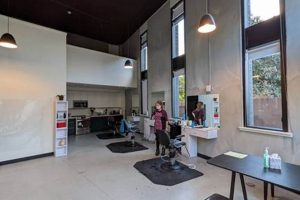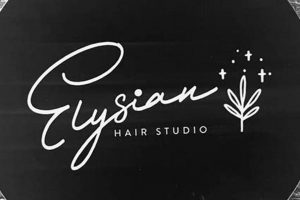A specialized establishment caters specifically to individuals with naturally curly hair. These spaces offer services and expertise distinct from general hair salons, focusing on the unique needs and characteristics of textured hair. This encompasses specialized cutting techniques, hydration treatments, and styling methods designed to enhance and manage natural curls.
These studios provide significant value by offering tailored solutions for maintaining healthy, defined curls. The emphasis on education and personalized care empowers clients to understand and manage their hair effectively. Historically, accessing specialized care for textured hair was limited, making these studios a vital resource for a previously underserved demographic. They address the challenges of frizz, dryness, and lack of definition often associated with curly hair.
Understanding the nuances of this specialized haircare requires exploring various aspects: from identifying individual curl patterns to implementing appropriate product regimens and styling practices. These considerations form the core elements of the following discussion concerning maintaining and enhancing naturally textured hair.
Curly Hair Maintenance
Maintaining healthy and defined curls requires a consistent and informed approach. The following guidance addresses key aspects of curly hair care, promoting manageability and enhancing natural texture.
Tip 1: Hydration is Paramount. Curly hair tends to be drier than other hair types due to its structure, which impedes oil distribution from the scalp. Utilize hydrating shampoos and conditioners formulated for curly hair. Incorporate deep conditioning treatments weekly to replenish moisture and enhance elasticity.
Tip 2: Employ Low-Manipulation Styling Techniques. Excessive manipulation can lead to breakage and frizz. Opt for protective styles, such as braids or twists, to minimize daily handling. When styling, use a wide-tooth comb or fingers to detangle gently, starting from the ends and working towards the roots.
Tip 3: Utilize the “Plopping” Method for Drying. This technique involves using a microfiber towel or cotton t-shirt to gently scrunch and lift curls, promoting definition and reducing frizz. Avoid vigorous rubbing, which can disrupt the curl pattern and cause damage.
Tip 4: Select Sulfate-Free Cleansers. Sulfates, common ingredients in many shampoos, can strip the hair of its natural oils, leading to dryness and frizz. Choose sulfate-free alternatives to cleanse gently while preserving moisture.
Tip 5: Protect Hair During Sleep. Friction against cotton pillowcases can cause frizz and breakage. Utilize a satin or silk scarf or pillowcase to reduce friction and maintain curl definition overnight.
Tip 6: Regular Trims are Essential. Regular trims, every 6-8 weeks, remove split ends and prevent damage from progressing up the hair shaft. Maintaining healthy ends contributes to overall hair health and promotes curl definition.
Consistent application of these techniques and careful product selection contribute significantly to the overall health and appearance of curly hair. Prioritizing hydration, minimizing manipulation, and protecting hair from damage are crucial for achieving optimal results.
The next section will delve deeper into specialized cutting techniques designed specifically for curly hair, further enhancing the understanding of curly hair care and maintenance.
1. Expert Curl-Specific Techniques
The existence of specialized techniques directly dictates the necessity for establishments focused on curly hair. General salon practices often prove inadequate for textured hair, potentially causing damage or failing to achieve desired aesthetic outcomes. Expert techniques, such as the DevaCut or RezoCut, address the unique way curly hair sits and moves. These approaches prioritize cutting the hair dry, curl by curl, allowing the stylist to account for natural shrinkage and curl patterns. This tailored methodology yields enhanced shape, reduced frizz, and improved overall manageability, demonstrating the practical importance of these techniques within establishments catering to curly hair.
These specialized cutting methods represent a fundamental component differentiating these focused establishments from general salons. Without proficiency in such techniques, a salon cannot effectively address the specific needs of clients with curly hair. The lack of this expertise can result in uneven cuts, compromised curl definition, and potential damage to the hair structure. For example, attempting to cut curly hair wet, as commonly practiced in general salons, often leads to significant length discrepancies and undesirable shapes once the hair dries. By contrast, establishments employing expert techniques deliver predictable and aesthetically pleasing results tailored to the individual’s curl pattern and desired style.
The application of expert curl-specific techniques is, therefore, not merely a service offering, but the core function defining a curly hair-focused establishment. The demand for these specialized services arises from the limitations of generalized approaches, highlighting the practical significance of expertise in catering to the unique characteristics of textured hair. Ultimately, understanding and mastering these techniques ensures client satisfaction, promotes hair health, and solidifies the establishment’s reputation as a dedicated resource for individuals with curly hair.
2. Specialized Product Knowledge
The success of a “the curly hair studio” hinges significantly on specialized product knowledge. Unlike general salons, these establishments cater to hair with distinct structural characteristics, demanding a deep understanding of product ingredients and their impact on curl patterns. The inherent dryness of curly hair necessitates moisturizers devoid of harsh sulfates, while achieving definition often requires stylers with specific holding properties. A lack of product knowledge results in misinformed recommendations, leading to frizz, breakage, or lack of desired definition, thereby undermining the studio’s value proposition.
This specialized knowledge extends beyond simply identifying “curly hair products.” It involves understanding the nuances of porosity, curl type, and environmental factors affecting hair health. For example, a studio might recommend a protein treatment for highly porous hair to rebuild the hair shaft, or suggest humectant-rich products in humid climates to prevent moisture loss. Furthermore, stylists must remain current with evolving ingredient technologies, differentiating between beneficial silicones and those that cause buildup. Proper product selection, informed by a thorough understanding of these factors, is crucial for achieving optimal results and maintaining client satisfaction.
In conclusion, specialized product knowledge constitutes a cornerstone of “the curly hair studio.” Its presence ensures informed recommendations, promoting healthy, defined curls. However, a continued commitment to education and adaptation to new product innovations is essential to address the diverse needs of individuals with textured hair effectively. This, in turn, reinforces the studio’s position as a trusted and knowledgeable resource for curly hair care.
3. Individualized Consultation Services
Individualized consultation services form a foundational pillar of establishments specializing in curly hair care. The inherent variability in curl patterns, hair density, and individual hair health necessitates a personalized approach. These services address the limitations of standardized haircare advice, which often proves ineffective or even detrimental to textured hair. The consultation process involves a detailed assessment of the client’s hair characteristics, lifestyle, and styling preferences, serving as the basis for tailored recommendations. For example, a client with fine, wavy hair requires a different approach than one with thick, tightly coiled hair, despite both identifying as “curly.” The success of treatments and styling heavily depends on this initial, individualized assessment.
The implementation of thorough consultation services directly impacts client satisfaction and retention. These sessions allow stylists to educate clients on proper haircare techniques, product application, and realistic expectations. For instance, a stylist might demonstrate the correct application of a styling gel to minimize frizz or provide guidance on protective styling to prevent breakage. This educational component empowers clients to manage their hair effectively between salon visits, fostering trust and long-term relationships. Furthermore, the consultation serves as a platform to address client concerns and adapt the haircare plan based on evolving needs, ensuring continued satisfaction with the services provided.
In summary, individualized consultation services are not merely an add-on feature, but a critical element of the overall value proposition. This service enables personalized solutions, fosters client education, and promotes long-term hair health. The absence of thorough consultations can lead to ineffective treatments, dissatisfied clients, and ultimately, a failure to meet the unique needs of individuals with curly hair.
4. Dedicated Hydration Treatments
A cornerstone of “the curly hair studio” lies in its commitment to dedicated hydration treatments. Curly hair, owing to its structure, presents unique challenges in maintaining optimal moisture levels. These treatments are not merely supplementary services but are integral to addressing the inherent dryness associated with textured hair.
- Counteracting Natural Dryness
Curly hair’s coiled structure hinders sebum distribution along the hair shaft, leading to increased dryness and vulnerability. Dedicated hydration treatments compensate for this deficit by infusing moisture directly into the hair cuticle. Examples include steam treatments, deep conditioning masks with humectants, and oil-based therapies designed to seal in hydration, mitigating frizz and enhancing elasticity.
- Customized Treatment Protocols
The effectiveness of hydration treatments depends on adapting protocols to specific hair characteristics, such as porosity and density. “The curly hair studio” assesses individual needs and formulates customized treatments using ingredients tailored to address particular deficiencies. A client with high porosity hair might benefit from protein-rich treatments to strengthen the hair shaft, while low porosity hair requires lightweight, water-based products to facilitate moisture absorption.
- Professional Application Techniques
The benefits of hydration treatments extend beyond the products themselves; professional application techniques contribute significantly to their efficacy. Stylists employ methods such as layering products, using heat to enhance penetration, and employing specialized tools to distribute treatments evenly. These techniques maximize moisture retention and improve the overall health and appearance of curly hair.
- Long-Term Hair Health Benefits
Consistent hydration treatments promote long-term hair health by strengthening the hair shaft, reducing breakage, and improving manageability. Hydrated hair is less prone to damage from styling, environmental factors, and chemical processes. “The curly hair studio” integrates these treatments into a comprehensive haircare regimen, ensuring sustained hydration and overall hair well-being.
The integration of dedicated hydration treatments within “the curly hair studio” signifies a comprehensive approach to textured hair care. By addressing the fundamental need for moisture, these treatments lay the foundation for healthy, defined, and manageable curls. This specialized focus differentiates these establishments from general salons, affirming their commitment to the unique needs of individuals with naturally curly hair.
5. Curl Pattern Identification
Within an establishment specializing in curly hair, accurate curl pattern identification is paramount, serving as the foundation for informed treatment, styling, and maintenance recommendations. It allows stylists to tailor their expertise to the specific needs and characteristics of each client’s hair, ensuring optimal results and promoting overall hair health.
- Accurate Product Selection
Different curl patterns exhibit varying degrees of porosity, density, and texture, impacting their responsiveness to different products. Identifying the curl pattern allows stylists to recommend products formulated to address specific needs, such as lightweight moisturizers for fine, wavy hair or heavier creams for thick, tightly coiled hair. Misidentification leads to product choices that may exacerbate problems like frizz, dryness, or product buildup, hindering the achievement of desired results.
- Effective Styling Techniques
Certain styling techniques are more effective for particular curl patterns than others. For instance, the “plopping” method may enhance definition in looser waves, while finger coiling proves more suitable for tighter coils. Knowledge of the client’s curl pattern enables stylists to implement techniques that maximize curl definition, minimize frizz, and create desired styles. Applying inappropriate techniques can result in a lack of definition, an unmanageable texture, or even damage to the hair.
- Optimized Cutting Methods
Specialized cutting techniques, such as the DevaCut or RezoCut, are designed to enhance the natural shape and movement of curly hair. These techniques are most effective when adapted to the individual’s curl pattern. Understanding the curl pattern informs the stylist’s approach, allowing them to create a haircut that complements the hair’s natural texture, minimizes bulk, and promotes even distribution of weight. Failure to consider the curl pattern during cutting can lead to an unbalanced haircut, uneven length distribution, and difficulty in achieving desired styles.
- Informed Treatment Strategies
The type and intensity of hair treatments should be tailored to the specific needs of the curl pattern. Fine, easily weighed-down curls may benefit from light protein treatments to strengthen the hair shaft without adding excessive weight. In contrast, coarse, tightly coiled hair may require deep conditioning treatments with emollient-rich ingredients to replenish moisture and improve elasticity. Accurate curl pattern identification ensures that treatments address the underlying needs of the hair, preventing damage and promoting overall health and vitality.
In conclusion, curl pattern identification is not merely a cosmetic assessment but a critical step in providing effective and personalized care. When performed accurately, it empowers stylists to make informed decisions regarding product selection, styling techniques, cutting methods, and treatment strategies, ensuring optimal outcomes and client satisfaction within the establishment specializing in curly hair.
Frequently Asked Questions
The following represents common inquiries regarding services, practices, and expected outcomes related to establishments specializing in curly hair.
Question 1: What distinguishes specialized curly hair establishments from general salons?
Specialized establishments focus exclusively on textured hair, employing techniques and products tailored to its unique characteristics. General salons often lack the expertise and resources required for optimal curly hair care.
Question 2: How frequently should hydration treatments be administered?
The frequency depends on individual hair porosity, environmental factors, and styling practices. Generally, weekly or bi-weekly deep conditioning treatments are recommended to maintain adequate moisture levels.
Question 3: What is the significance of identifying individual curl patterns?
Accurate identification informs the selection of suitable products, styling techniques, and cutting methods. Different curl patterns respond differently to various treatments, necessitating a personalized approach.
Question 4: Are sulfate-free cleansers universally recommended for curly hair?
Sulfate-free cleansers are generally recommended due to their gentle cleansing action, which minimizes moisture stripping. However, individuals with significant product buildup may require occasional use of clarifying shampoos.
Question 5: Can specialized cutting techniques repair damaged curls?
Specialized cutting techniques primarily enhance the shape and manageability of curls. While they remove damaged ends, restoring hair health requires consistent hydration, gentle handling, and protective styling practices.
Question 6: What factors influence the long-term health and appearance of curly hair?
Consistent hydration, appropriate product selection, minimal manipulation, protective styling, and regular trims contribute significantly to the overall health, definition, and manageability of curly hair.
Consistent attention to these considerations fosters optimal outcomes within a studio environment. Tailoring services and approaches is key.
The subsequent discussion will explore maintaining curly hair health at home.
Conclusion
The preceding exploration underscores the unique value proposition of a specialized establishment. The discussion has ranged from expert cutting techniques and individualized consultations to the critical importance of hydration treatments and curl pattern identification. These distinct elements collectively define its operational scope, distinguishing it from general salons and highlighting its focused commitment to the specialized needs of individuals with naturally textured hair. The mastery of specialized product knowledge, and individualized hair analysis form the fundamental elements of the overall success of curly hair.
Continued advancements in haircare science, combined with a deeper understanding of diverse curl patterns, promise further innovation and enhanced outcomes. Recognizing the significance of these specialized facilities ensures that individuals with curly hair have access to tailored expertise and comprehensive care. The future of curly hair treatment involves continued refinement and deeper understanding of curly hair.







